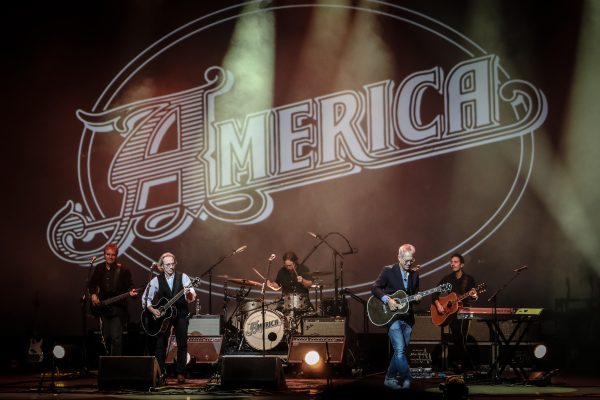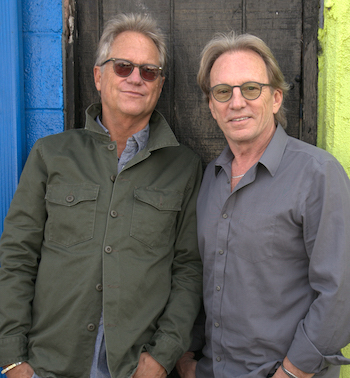Concert Review/Interview: America at Lowell Memorial Auditorium
By Jason M. Rubin
In Lowell, America played to a packed, enthusiastic, Centrum Silver-popping crowd who sang along with the band’s impressively deep roster of hits.

The latest version of America in action, live in concert. Photo: Christie Goodwin.
The enjoyable America concert at the Lowell Memorial Auditorium was nearing its end. The band launched into “Sandman” with a heaviness and power most rock fans would not expect of America, those soft-rock superstars of the ‘70s. Now on their 50th anniversary tour (half a century ago this week, their debut album and the single “Horse With No Name” both sat at #1 on the Billboard charts), America had energy to spare and a hot band of young bucks behind them. As they wailed on “Sandman,” I had one thought on my mind: “Damn, if I closed my eyes this could be the Foo Fighters.”
At the very moment I made this connection, though I didn’t learn the news until I got home, Foo Fighters drummer Taylor Hawkins was dying or already dead.
That terrible coincidence aside, America acquitted itself quite well in concert. Playing to a packed, enthusiastic, Centrum Silver-popping crowd who sang along with an impressively deep roster of hits, the band played every song on its multi-platinum greatest hits album from 1975. (With the exception of “Muskrat Love,” a song choice they likely regret.) They also played their 1982 comeback hit, “You Can Do Magic,” and a selection of album cuts from their heyday, as well as songs from the ’80s, ‘90s, and ‘00s that are less well known but no less appreciated by the adoring crowd. Two covers were added, each with some context given: “Eleanor Rigby” by the Beatles, in recognition of the fact that George Martin produced seven consecutive America albums starting in 1974; and “California Dreamin’” by the Mamas and the Papas, representative of the type of bands that were big and who influenced them when they first got together in the late ‘60s.
For those who don’t know, America these days comprises original members Dewey Bunnell and Gerry Beckley. Third original member Dan Peek left the band in 1977 to pursue a solo career as a Christian music artist. He died in 2011. Three of Peek’s contributions to their repertoire were represented in the set list: “Don’t Cross the River,” “Woman Tonight,” and “Lonely People.”
In spite of their enormous success and longevity, America is dismissed in some quarters as being the quintessential white hippie band, a purveyor of mellow sounds that evoke the days of free love and bell bottoms. The band’s signature song, “Horse With No Name,” is often chided for its banal lyrics (“the heat was hot” and why the hell doesn’t the horse have a name?). The opening to “Ventura Highway” was nicked to serve as the theme music of the Saturday Night Live recurring skit, “The Californians.” And then there’s the aforementioned “Muskrat Love.” But there’s no denying that “Ventura Highway,” “Sister Golden Hair,” and “Lonely People” — among many, many others, including deep cuts this writer wished they had played — are great songs, well written, well played, and well sung.
In fact, their voices are as strong as ever, and are bolstered by their three-piece band, all of whom offered harmonious background vocals (the drummer sang lead on Peek’s “Don’t Cross the River”). Additionally, they know their way around their instruments. Beckley, in particular, ripped off a number of tasty solos on both acoustic and electric guitar, and played piano as well. A week prior to the concert, I spoke with Beckley about the band’s long career.
Arts Fuse: Your song “Remembering” includes the line that you aren’t “the kind who likes remembering.” Still, what do you recall from those first recording sessions in March 1971? Did you guys have a sense of what your sound was and how unique it would be?

Gerry Beckley and Dewey Bunnell of America. Photo: courtesy of the artists.
Gerry Beckley: We had been playing live together for several months when we went in to make the first record so there were not a lot of surprises. As a group, though, we hadn’t done enough recording to know exactly what we were going to get in terms of results. But we had a great producer in Ken Scott and I do remember the sessions went very smoothly.
AF: At any time during the pandemic, with shows being cancelled and having to quarantine, did you ever think that this could — or should — be the end of your career as public performers?
Beckley: This is a dynamic and a challenge that the whole world has had to face. We were already in the middle of our 50-year celebration, and then we had a year of shows postponed. It’s great to be back on stage and playing for people again, and I think people are ready to go out and see live music again.
AF: Regardless of which of the three of you was the composer, you can tell an America song by the sound and the style. Did you guys talk a lot about the craft of songwriting in the early years?
Beckley: I think structure is important in any art form. We were students of all the great hit records of our childhood. There are certain things that make a song work — which is to say there are rules of songwriting but you also need to know when and how to break the rules. For example, every song doesn’t need a bridge. The drums don’t have to come in right at the start. Dewey and I are writers and we write what’s in our hearts and minds.
AF: Over the course of 50 years we’ve seen so many styles of music come and go, but America has never compromised, never did a disco album, for example, never went punk or tried to rap. What is it about America’s music that makes it so timeless?
Beckley: We know where we’re heading when we approach each project, and we know what our strengths are. After 50 years, we’re lucky to have so many records to look back on. Now, not all of them are winners. But overall we’re proud of what we have done and that we kept the thing on the tracks. I do think our shows are better than ever.
Jason M. Rubin has been a professional writer for more than 35 years, the last 20 as senior creative associate at Libretto Inc., a Boston-based strategic communications agency where he has won awards for his copywriting. He has written for Arts Fuse since 2012. Jason’s first novel, The Grave & The Gay, based on a 17th-century English folk ballad, was published in September 2012. His current book, Ancient Tales Newly Told, released in March 2019, includes an updated version of his first novel along with a new work of historical fiction, King of Kings, about King Solomon and the Queen of Sheba. Jason is a member of the New England Indie Authors Collective and holds a BA in Journalism from the University of Massachusetts Amherst.
Tagged: America, Gerry Beckley, Horse With No Name

Really? Centrum Silver popping? That’s pretty rude! They are older then most of the audience!
It was a great show and it was a good mix of ALL ages.
Was a great concert. The auditorium was packed with young and old alike. They played all of their great hits along with a Beatle’s song and an Al Green song. Great night out.